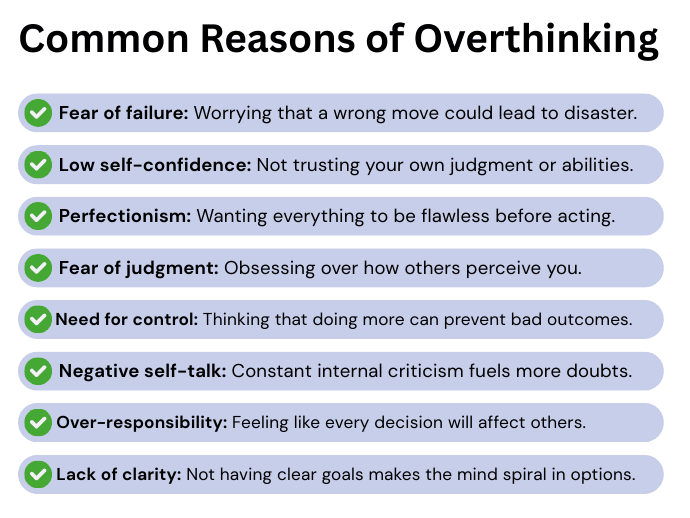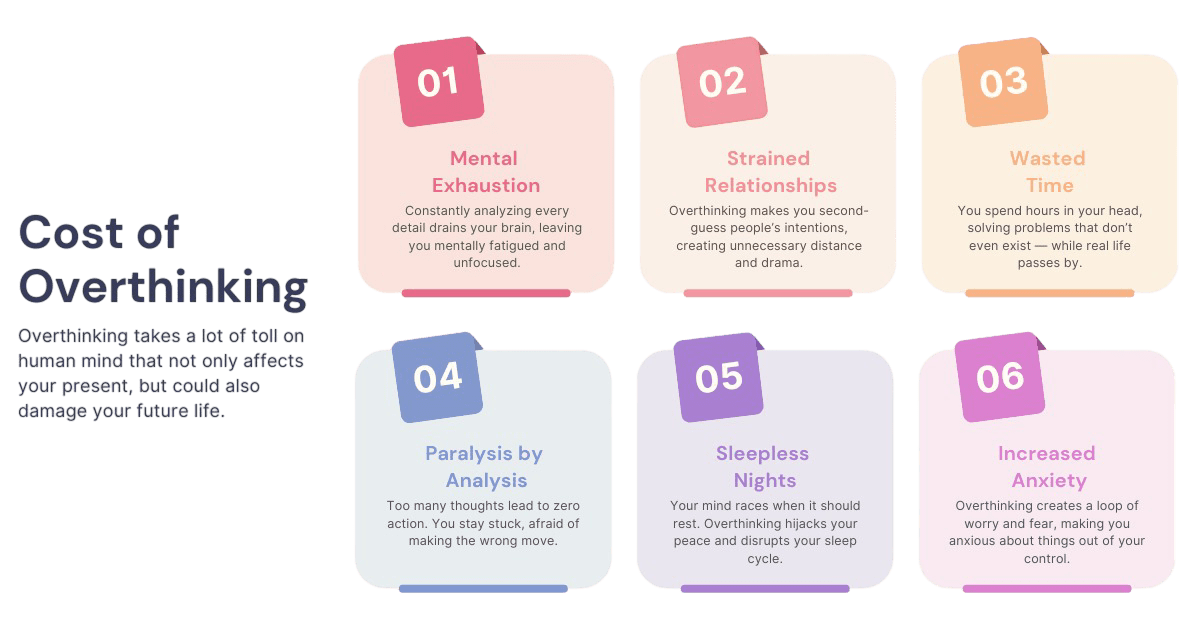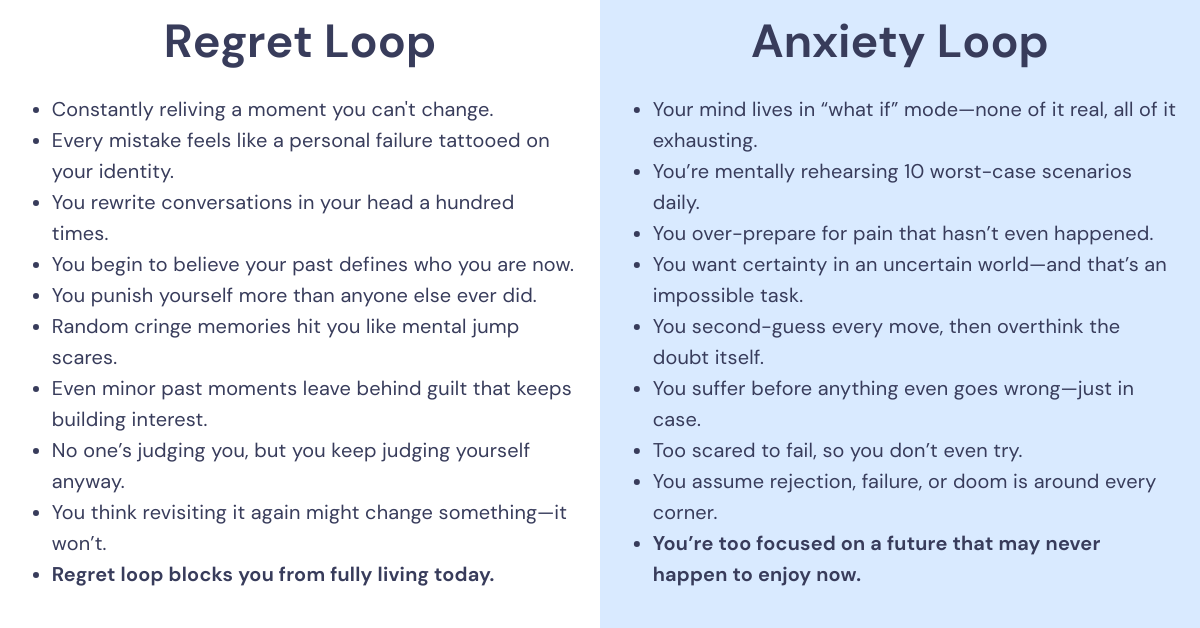What is Overthinking?
Overthinking is when your brain just won’t shut up. It’s like having a background app that eats your battery all day long. You’re not solving anything, you’re just constantly looping the same thoughts, fears, “what ifs,” regrets, and imaginary situations until you feel mentally fried.
It’s not thinking—it’s self-torture. You’re not planning, you’re panicking. You’re not analyzing, you’re paralyzing yourself.
Overthinking is the art of creating problems that weren’t even there.Nina Ansari
We all have thoughts. But when those thoughts become a never-ending loop of anxiety, guilt, or fear, you’ve entered the overthinking zone. And once you’re in, it’s like a maze with no exit unless you take deliberate action.
Why Do People Overthink?
Let’s be real. There are several reasons people think, but only a few selected reasons people “over”-think:
- Fear of making the wrong choice.
- Lack of trust in yourself.
- Anxiety about the future or shame about the past.
If you’re always second-guessing yourself, that’s not intelligence. That’s a self-confidence issue. Smart people know when to think—and when to let go. Overthinking is often a scar left by pain, not a flaw in character.

You probably had a few situations in life where you made a mistake. Or someone shamed you. Or you faced consequences that were too painful to forget. So now your brain is trying to “prevent future pain” by replaying every possible scenario in your head. It’s a trauma response disguised as caution.
The Mental Cost of Overthinking
Overthinking feels like you’ve worked a 10-hour shift without actually doing anything. You don’t do any significant work, don’t create anything, and don’t even make a decision, yet you still feel as if you’ve been working in construction since morning.
You were just busy inside your head. And guess what? Your brain isn’t designed for that kind of load. It needs rest from exhaustion; how do you exhaust your mental energy?
By overthinking things that provide no value in the short or long term.
When you overthink, you burn your mental energy, drain your focus, and become emotionally exhausted without even moving a muscle.

This is why people who overthink a lot tend to:
- Feel tired all the time
- Struggle to concentrate on smallest tasks
- Experience random anxiety attacks
- Have a short fuse or get irritated easily
- Lose sleep at night
Your mind is screaming for a break, but you won’t let it rest, or at least your subconscious mind won’t.
The Two Types of Overthinking
Let’s separate overthinking into two flavors:
1. Regret Loop
This is one of the common practices amongst the overthinkers: reliving past memories and feeling regret every time. You just can’t seem to forget it.
- “Why did I say that?”
- “I should’ve done it differently.”
- “I always fuck things up.”
- “I wish I would’ve said ___ instead of ___.”
You’re carrying guilt and self-blame like it’s your identity. You assume your past defines you, and you keep punishing yourself in your head even if no one else is judging you.
People aren’t thinking about you as much as you think. They’re too busy thinking about themselves.David Foster Wallace (paraphrased)
2. Anxiety Loop
The common “what if” disease. Getting too much fixated on your future, regardless of whether that future is possible or not:
- “What if this goes wrong?”
- “What if I lose everything?”
- “What if I’m not good enough?”
- “What if they said ‘no’?”
You try to predict every possible disaster so you can be prepared for the pain it feels, but guess what? While you were predicting, you went through all the pain there could be. If you had just gone with it without trying to overthink, the pain would’ve been minimal.

Both types do the same damage: they stop you from living in the now.
Signs You’re an Overthinker
If you relate to four or more of these, welcome to the overthinker’s club:
- You replay conversations after they’ve ended.
- You can’t stop imagining worst-case scenarios.
- You struggle to make decisions—even small ones.
- You worry about what people think of you 24/7.
- You hate making mistakes and often feel like a failure.
- You overanalyze texts, tone of voice, and social situations.
- You procrastinate because you want the outcome to be “perfect.”
The Hidden Link Between Overthinking & Low Self-Esteem
Most chronic overthinkers suffer from self-doubt. Somewhere deep down, they don’t think they’re enough. So every decision, every step, every plan becomes a battlefield. They think:
- “If I mess this up, people will hate me.”
- “If I fail, that means I’m worthless.”
- “If I succeed, I have to do even better next time.”
This isn’t thinking. This is mental self-sabotage.
What Happens If You Don’t Fix This?
Let’s keep it real — if you don’t deal with your overthinking habit, it will quietly wreck every moment of your life.
- You’ll feel disconnected from people, even the ones you love, because you’re too stuck in your head to show up fully.
- You’ll sabotage relationships—not out of malice, but because your brain keeps replaying doubts and imaginary fights.
- You’ll miss out on chances that could’ve changed your life—because you were “still thinking it through.”
- You’ll wear yourself down—mentally, emotionally, and physically. You’ll feel tired even after 8 hours of sleep, and stress will become your default setting.
Overthinking gives the illusion of control. You feel like you’re being cautious or smart. But what’s really happening is you’re getting stuck, frozen and wasting time.
Watching life move forward while you’re buffering like a bad internet connection.
Here’s the truth: the world won’t stop for your thoughts. And no one’s handing out trophies for who worries the most.
You don’t need a perfect plan. You need a damn decision.
How to Get Out of the Overthinking Loop
Now that you’ve understood (or you already knew) overthinking, let’s talk about real stuff. How do you deal with this?
Not with fake positivity. No breathing exercises. Not generic “stop worrying” advice. These are some raw strategies that help (if you do them, obviously):
1. Set Decision Time Limits
You’re not allowed to think about something for more than X minutes. Force a decision.
- Small choices = 1-5 mins.
- Medium = 10-30 mins.
- Big life decisions = max 24 hours.
If you’re still not sure if you can make a decision in such short notice, no worries. Write it down in a journal. Read it a few times before going to bed and let your subconscious process and work out the decision for you.
2. Use the 80% Rule
If you’re 80% sure about something, go for it. Perfection is bullshit. Waiting for 100% certainty is how people end up old and full of regrets.
3. Write a Thought Dump
Take a notebook or app and vomit your thoughts there. No filter. No logic. Just dump everything. Your mind needs an outlet. And for god’s sake, don’t think here. Just write every shitty thing that comes to mind.
Once the thoughts are on paper, they lose power. You realize most of them are repetitive junk.
4. Challenge the Thought
Whenever you catch yourself overthinking, ask yourself if this thought is helpful somehow. If it is not, properly dump the thought.
Your subconscious is feeding you these thoughts, and the subconscious always wants to be in control. If you challenge it directly, it will resist. You need to program your subconscious in a positive manner. Discard your thoughts by saying:
- I’m working on ____, maybe later.
- Yes, I will surely think about it. Now let’s go back to ____
- Sounds good. Let the situation arise, and I will get it done.
This way, you’re not challenging your subconscious directly. You’re acknowledging it and letting it know what’s important right now.
5. Act Without Emotion
If you’re sure you need to do something, there is no reason to “think about it”. Just act. You don’t need to prepare or be ready for it. Train your body and mind to take steps even when you’re scared and even if you don’t know the next steps afterwards.
Take the first step… and the next will be revealed.Ken Roberts, A Rich Man’s Secret
Build this like a muscle. Start small. Take that action you’ve been delaying.
Final Words: You Are Not Your Thoughts
If overthinking is eating your peace, you have to understand something very deep: you are not your thoughts. You’re the awareness that watches them.
Let your mind speak. But don’t always listen. Let the voice run in the background, but don’t let it drive the car.
There’s a version of you that’s calm, focused, and confident. But that version only appears when you stop fueling the overthinking machine.
So stop waiting for clarity. Clarity comes after action, not before it.
Your brain might not shut up—but that doesn’t mean you have to listen. If you need something done and you know that it needs to be done, there’s no thinking about it. Take the damn action, no matter how small.
Keep yourself busy with work and social life if you wish to handle overthinking the best way possible. Learn more about how to build social life.

